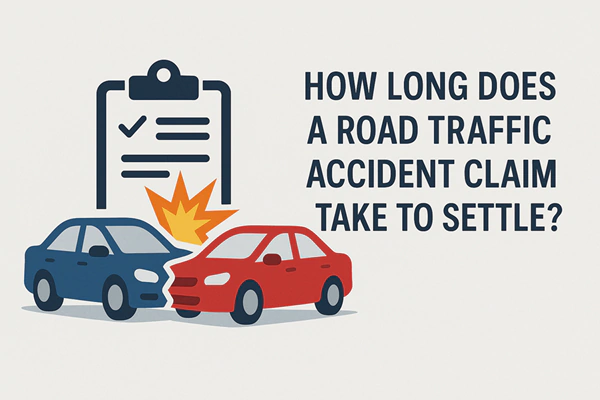If you’ve been involved in a road traffic accident and are considering making a personal injury claim, one of the first questions you’ll likely ask is, How long will it take to settle? The answer depends on several key factors, including the severity of your injuries, who was at fault, and how quickly the necessary information is gathered. In this post, we’ll walk you through the typical timeline of a road traffic accident claim in the UK and what you can expect along the way.
Typical timeframes for road traffic accident claims
On average, a straightforward road traffic accident claim in the UK can take between 4 to 9 months to settle. However, this can vary depending on the complexity of the case. Here’s a general breakdown:
1. Simple claims (no dispute over liability)
If the other party accepts fault and your injuries are minor (such as soft tissue injuries or whiplash), your claim may settle quickly, often in a few months. These claims usually follow the Pre-Action Protocol for Low Value Personal Injury Claims, which aims to speed up the process using an online portal.
2. Moderate claims (some disputes or delays)
If there’s disagreement over who caused the accident, or if the injuries are moderate and require longer medical assessments, the process might take 6 to 12 months. Your solicitor may need to gather additional evidence such as medical reports, witness statements, or vehicle assessments.
3. Complex or serious injury claims
For more severe injuries, such as fractures, head injuries, or long-term mobility issues, claims can take over a year to resolve. In these cases, your solicitor will wait until a full medical prognosis is available before settling, ensuring your compensation reflects the long-term impact of your injuries.
Key factors that affect how long your claim takes
Several variables influence how quickly your road traffic accident claim can be resolved:
- Liability disputes: If the other driver denies responsibility, extra time will be needed to gather evidence.
- Injury severity: More serious injuries require longer recovery and assessment periods, which can delay settlement.
- Medical evidence: You’ll need an independent medical examination, which can take time to arrange and complete.
- Insurer communication: Some insurers are quicker to respond and negotiate than others.
- Court proceedings: If a fair settlement can’t be reached, your case might go to court, which can extend the timeline considerably.
Can you speed up the process?
While some delays are unavoidable, here are a few ways to help things move more efficiently:
- Report the accident promptly to your solicitor.
- Provide all requested documents quickly, including witness contact details, photos, and insurance information.
- Attend medical appointments without delay.
- Be clear and responsive with your solicitor throughout the process.
How Marley Solicitors can help
At Marley Solicitors, we specialise in handling road traffic accident claims across the UK. Our team understands how stressful the aftermath of an accident can be, especially when you’re recovering from injuries and dealing with insurers. We take the pressure off by managing every step of your claim, from gathering evidence to negotiating your settlement.
Working on a no win, no fee basis, we ensure that there’s no financial risk to you. With over 25 years of experience, we’re committed to securing the compensation you deserve as efficiently as possible, without compromising on the quality of your outcome.
Final thoughts
Every road traffic accident claim is different, but having the right legal team can make the process smoother and quicker. If you’ve been injured in an accident that wasn’t your fault, don’t delay. The sooner you start your claim, the sooner you can receive the support and compensation you’re entitled to.
Contact Marley Solicitors today to speak with a member of our team and get your claim moving in the right direction.


